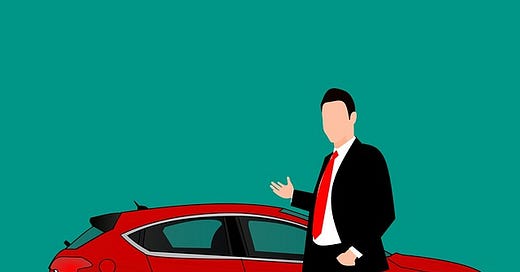Free rides for everybody (who trades in their data)
"Zero dollar car" is a concept that is long overdue for discussion among mobility experts.
I was crowdsourcing a research project and someone pointed me to a story in Los Angeles about tracking people's movements after they rent a scooter or a bike. Big brother stuff. Specifically, the article was focused on what to do with all that information about people’s travel habits.
The brains behind the LA tracking program was a man named John Ellis, who had given a TEDx Talk called The Zero Dollar Car: How big data will transform the transportation industry.”
You should absolutely watch the talk, but here’s the spoiler:
As cars, appliances, and other devices are equipped with sensors, you may be able to trade that data for money and drastically reduce the cost of purchasing just about anything.
Sign me up! Maybe.
Cities and counties want to make data-based decisions with their infrastructure. In other words, they want to know where you live, where you shop, where you work, and all the streets and sidewalks and alleyways you used to get there. The desire comes from a good place. They want to know which streets need more bike lanes, curb and gutter, or whatever other improvements.
This talk that John Ellis gave is an important one. He talks about things that are obvious to advertisers and digital marketers, but not so obvious to the government agencies. And definitely unknown material among civil engineers and urban planners.
Modern cars have tons of sensors in them that relate to road surfaces, the weather, the wear and tear of wheels and engine parts, and of course the location of the vehicle. This data has enormous value for a bunch of different groups that would pay handsomely for access to the data.
Imagine being in the market for a new electric car, and you have two price points to choose from:
Pay $50,000 for the new car. They don't track or sell any of your data.
Pay $0 for the new car. They track and sell all your data.
Of course there would be more than two options in a competitive market. But let that idea sink in. “My data, my choice”?
Anyone who uses a standard smartphone gave up on personal privacy. And even if you don't use a smartphone, if you’re reading this post from your “free” LinkedIn account or “free” Gmail, you’ve already signed away personal data. That’s why it’s free.
There's a business model here for mobility that’s worth exploring.
Imagine having access to a library of cars, bicycles, buses, moving vans, skateboards, and whatever else with subscription packages based on the amount and type of data you trade.




